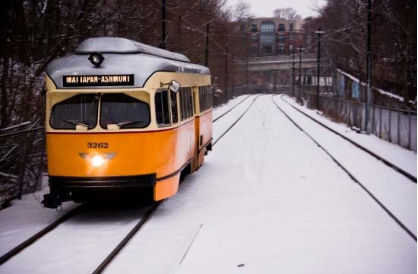February 27, 2017

The MBTA will pump $7.9 million into a repair project that will keep its fleet of PCC trolley cars running on the Mattapan High Speed Line for “the near future” as an independent review of the line’s infrastructure continues this year. T officials say that the investment will focus on rebuilding the trolley “trucks”— the undercarriage that houses the key mechanical components of the World War II-era, Worcester-built cars.
The plan was outlined in a “State of the Line” report to the MBTA’s Fiscal and Management Control Board on Monday at MBTA headquarters. Officials plan to host three public meetings in Mattapan, Dorchester, and Milton in April to offer a more detailed explanation and solicit input from the community.
The MBTA currently maintains a 10-car fleet of the aging PCC cars, which have been in service in the system since 1945-46. The vehicles have been kept running via major repair projects in the 1980s and again in the early 2000s. MBTA union engineers and craftsmen have also kept the trolleys running by manufacturing replacement parts that are hard to buy or just plain obsolete.
The line is considered a vital and generally reliable link from Mattapan and Milton to the wider T system and downtown Boston, providing seven- day-a-week service along a 2.6 mile route between Ashmont and Mattapan Square with six stops in between. But the aging cars are a constant worry for repair crews— and despite popular resistance and push-back from elected officials— T officials have begun to sketch out potential alternatives for replacing the cars.
“With this investment, we can be relatively confident this is gonna get us out until maybe the early 2020s,” said Jeffrey Gonneville, the MBTA’s chief operating officer, “and that gives us enough time to do the due diligence study to really give us the information we need to make the right decision for what will be the future of this line.”
In the near term, at least, champions of the line hail the MBTA’s investment as a victory. Rep. Dan Cullinane, who testified before the board on Monday morning in support of the line, emphasized that his constituents want the existing trolley fleet preserved. They are not only an important link for commuters, he said, but also a cherished link to the city’s history that adds “character” to the neighborhoods it serves.
Cullinane noted that other cold-weather cities, including Philadelphia, manage to keep larger fleets of vintage PCC cars in service over much longer stretches of track. “If Philly can do it on a line with 50 stops, surely we can do it on an 8-stop line,” he said. “People emphatically love this trolley.”
Cullinane thanked the board and the T staff for “hearing” the concerns raised by him and a coalition of city and state elected officials, who last year pressed MBTA leadership to commit to preserve the trolley line and the existing PCC cars.
Brian Kane, the MBTA’s director of operations analysis, told the Reporter on Monday that the bulk of $7.9 million in repairs can actually be done on site at the Mattapan car house where the 10-car fleet is typically serviced. More complex repairs are often done at the MBTA’s Everett Shops, the heavy rail maintenance facility near Sullivan Square where 140 union workers keep more than 600 MBTA rail vehicles in service.
Kane said that some of the initial work and training will be done there, but that the PCC “trucks” will mainly be restored and re-assembled in Mattapan. The work will include assembling kits that will be used to replace key components of the trolley’s mechanical systems. The project will expand the number of trolleys available for daily service from 7 to 8.
Meanwhile, a team of consultants from the engineering firm CH2M Hill, Ltd. is now engaged in a year-long “due diligence” study of the line’s current conditions— from tracks and stations to bridges and cables— to assess the MBTA’s next moves.
“The PCCs are over 70 years old, and its our duty as stewards to plan for the future,” said Kane, adding: “We are very open minded. We don’t have a solution in mind that we’ll just back into.”
He said that various options for vehicles will be considered— including keeping the existing PCC cars. Other options specifically mentioned include Bus Rapid Transit, other light rail vehicles, replica trolleys, or alternative technologies that are not yet available for mass transit, including all-electric cars.
“The Mattapan line might be a good place to be innovative,” he said, noting that the report specifically instructs CH2M Hill, Ltd. to include “peer benchmarking”— a review of what other cities that use PCCs in cold-weather climates are doing to keep their fleets on track. The contract awarded to CH2M Hill, Ltd. calls for a report to be in hand by next winter.
The T has scheduled the first public meeting for April 3 at the Mattapan branch of the BPL on Blue Hill Avenue; the second is planned for April 13 at Milton High School; and the last is set for the Lower Mills branch of the BPL on April 24.
The agency will post documents related to the Mattapan line on a page on its website: MBTA.com/MattapanHSL.
Jennifer Smith contributed reporting.
Topics:


